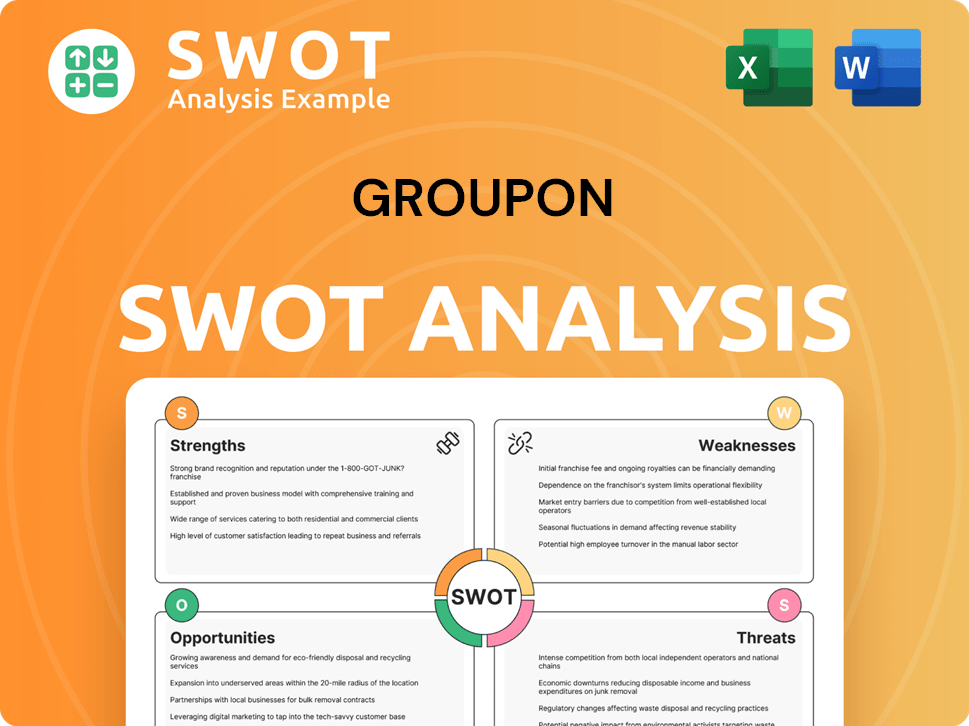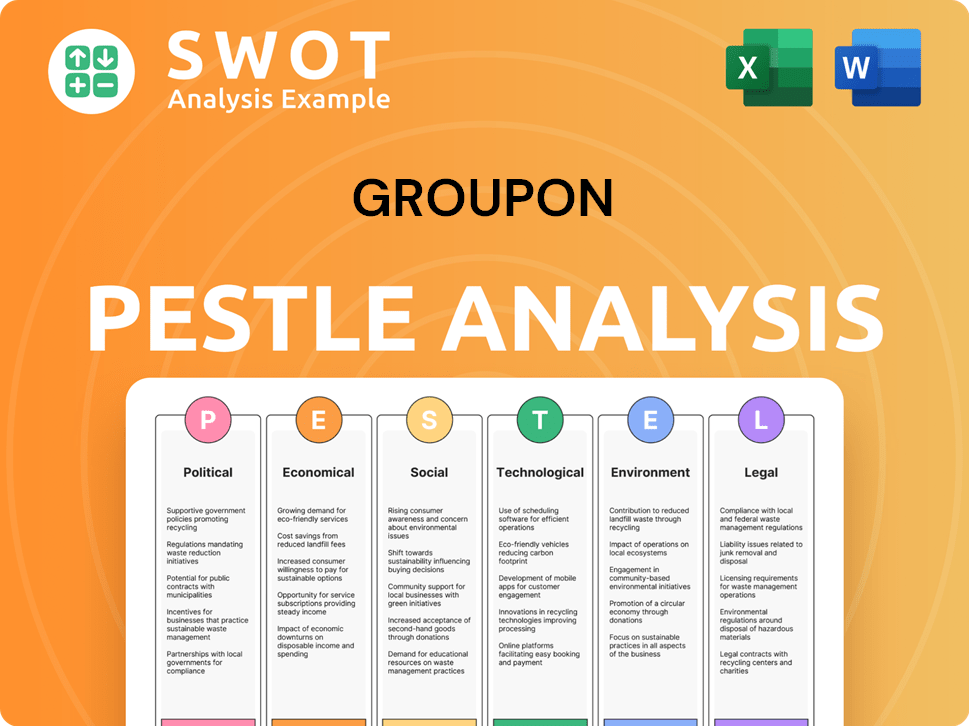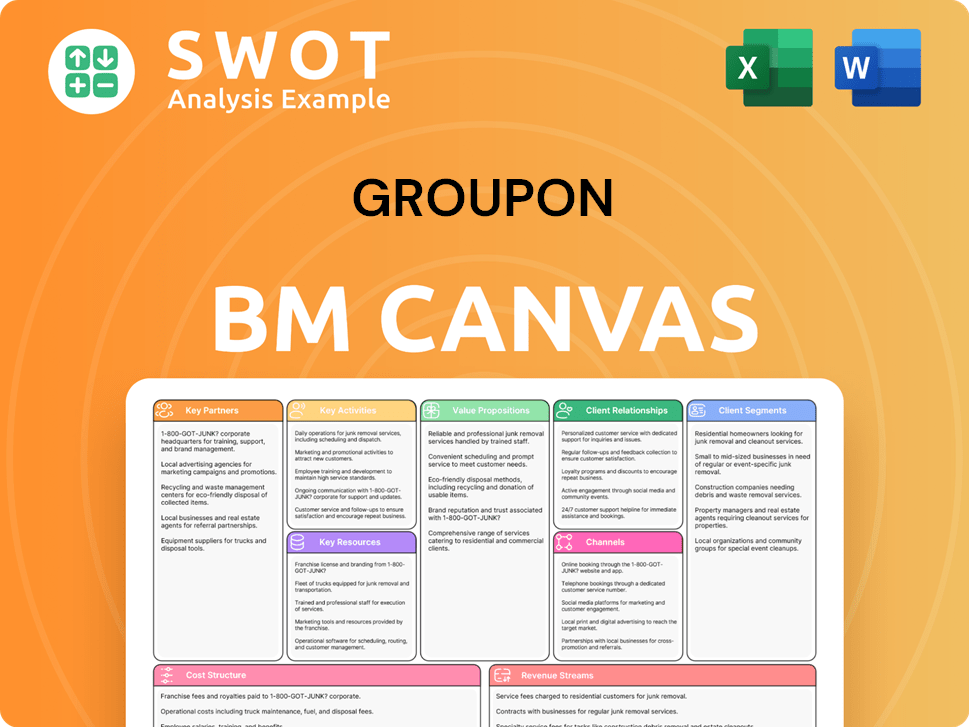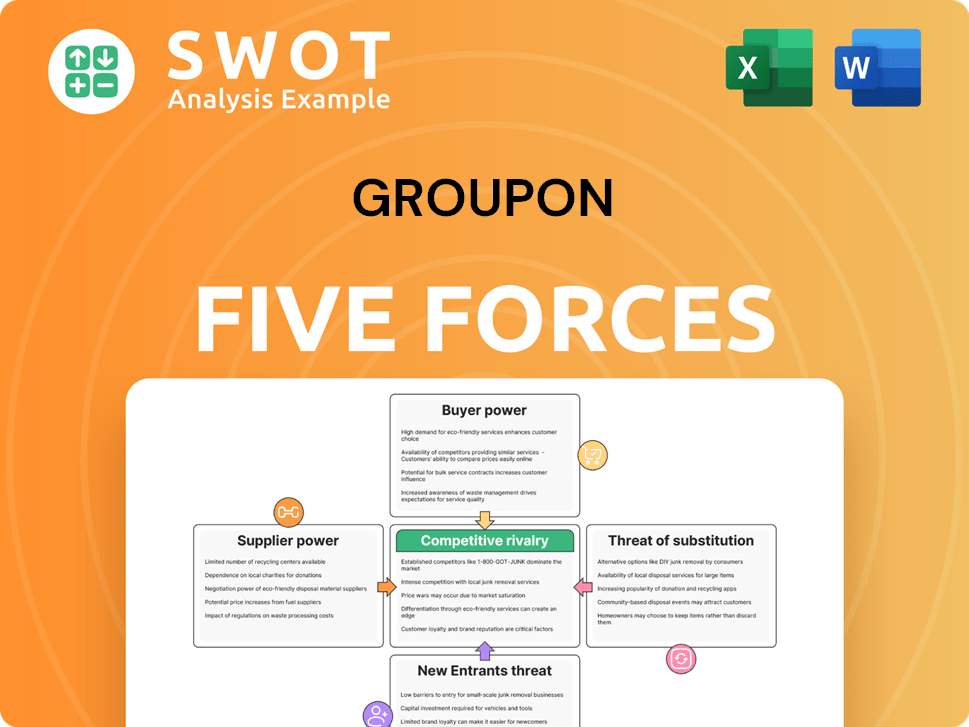Groupon Bundle
Who Really Controls Groupon?
Understanding the ownership structure of a company is crucial for investors and strategists alike. Groupon's journey, from a startup to a publicly traded entity, offers a fascinating case study in corporate evolution. Discover how the Groupon SWOT Analysis can help you understand its position in the market.

This analysis explores the evolution of Groupon ownership, tracing its path from its founders and early backers to its current shareholders. Knowing who owns Groupon is key to understanding its strategic direction and financial health, especially when considering its history and business model. We'll examine the major players influencing Groupon's future, including its current owners and the impact of its acquisitions.
Who Founded Groupon?
The company, now a well-known name in the daily deals market, was founded in November 2008. The founders' vision and initial funding laid the groundwork for what would become a significant player in the e-commerce sector. Their early decisions shaped the company's trajectory, influencing its growth and eventual public offering.
The founders, Andrew Mason, Eric Lefkofsky, and Brad Keywell, each brought unique skills and perspectives to the table. Mason's initial concept, born from a personal frustration, evolved into a business model. Lefkofsky's entrepreneurial experience and financial backing were crucial to the company's early development. Keywell's strategic input further solidified the company's direction.
Understanding the early ownership structure of the company provides key insights into its evolution. From its inception, the founders' roles and investments were essential to the company's initial success. The early ownership dynamics highlight the strategic decisions and financial backing that propelled the company forward.
Founded in November 2008 by Andrew Mason, Eric Lefkofsky, and Brad Keywell.
Andrew Mason conceived the idea from his frustration with a mobile phone contract.
Eric Lefkofsky provided $1 million in seed money through his investment.
The initial platform was 'The Point,' launched in 2007, which focused on collective action.
Brad Keywell played a crucial role in the company's strategic direction.
By April 2010, the company had raised $135 million in venture capital.
The early ownership structure of the company, including the founders and early investors, significantly influenced its trajectory. Early investors like New Enterprise Associates provided crucial financial backing. The founders, particularly Eric Lefkofsky, maintained substantial control through a dual-class share structure, ensuring their influence even after the initial public offering. This structure allowed the founding team to maintain control over the company's strategic direction. For more information on how the company grew, you can read about the Growth Strategy of Groupon.
At the time of the IPO in 2011, the three co-founders collectively owned over a third of Groupon's common stock.
- Eric Lefkofsky owned 129.2 million common shares, giving him over 58% of the voting power.
- The dual-class share structure gave Class B shares, held by management, 150 votes apiece, while Class A shares had one vote per share.
- This structure ensured that insiders retained substantial voting power.
- Early investors included New Enterprise Associates.
Groupon SWOT Analysis
- Complete SWOT Breakdown
- Fully Customizable
- Editable in Excel & Word
- Professional Formatting
- Investor-Ready Format

How Has Groupon’s Ownership Changed Over Time?
The evolution of Groupon's ownership has been marked by significant milestones, starting with its initial public offering (IPO) on November 4, 2011. The IPO, which raised approximately $700 million, was a pivotal event that transformed its ownership structure, introducing a mix of institutional and individual investors. Before the IPO, Groupon secured substantial venture capital, including $135 million by April 2010 and an additional $950 million from investors like Andreessen Horowitz and Kleiner Perkins Caufield & Byers in January 2011. These funding rounds were critical for Groupon's rapid expansion but also diluted the stakes of early investors.
The ownership structure of Groupon reflects a dynamic landscape influenced by financial performance and strategic leadership changes. As of May 2025, institutional investors hold a significant majority, at 67.59%, while individual investors hold 32.79%. Insiders, including company executives, hold a smaller percentage, approximately 0.27%. The appointment of Dusan Senkypl as permanent CEO in May 2024, coupled with his role as a co-founder and partner in Pale Fire Capital, the largest shareholder with a 26% stake as of July 2024, highlights the interplay between leadership and ownership. The company's financial results, such as the $497.8 million in revenue and a net loss of $44.7 million in 2024, alongside a positive free cash flow of $40.6 million, and a net income of $8.027 million as of March 31, 2025, also influence investor confidence and shareholding patterns. Understanding the Marketing Strategy of Groupon provides further insight into how these factors shape the company's trajectory.
| Ownership Category | Percentage (May 2025) | Key Holders |
|---|---|---|
| Institutional Investors | 67.59% | Vanguard Group, BlackRock Fund Advisors, Dimensional Fund Advisors LP, Pale Fire Capital SE |
| Individual Investors | 32.79% | Various |
| Insiders | 0.27% | Company Executives and Board Members |
The current ownership of Groupon is primarily composed of institutional investors, individual investors, and company insiders. The largest shareholder is Pale Fire Capital SE, with a 26% stake as of July 2024. The company's financial performance, including revenue and net income figures, plays a crucial role in shaping investor confidence and shareholding patterns. The shift in leadership, with Dusan Senkypl becoming CEO, also reflects changes in strategic direction and control, particularly given his connection to the largest shareholder.
Groupon's ownership structure is primarily institutional, with a significant portion held by investors like Vanguard and BlackRock.
- Institutional investors hold the majority of shares.
- Pale Fire Capital SE is the largest shareholder.
- The company's financial performance influences investor behavior.
- Leadership changes reflect strategic shifts.
Groupon PESTLE Analysis
- Covers All 6 PESTLE Categories
- No Research Needed – Save Hours of Work
- Built by Experts, Trusted by Consultants
- Instant Download, Ready to Use
- 100% Editable, Fully Customizable

Who Sits on Groupon’s Board?
The current board of directors at Groupon plays a vital role in overseeing the company's direction and representing shareholder interests. As of June 2025, Dušan Šenkypl serves as the Chief Executive Officer and a Director, having been appointed permanent CEO in May 2024. He previously served as interim CEO since March 2023. Theodore Leonsis is the Independent Chairman of the Board. Other board members include Jason Harinstein, Robert Bass, and Jan Barta, who is a Board Observer and Independent Director. This structure reflects ongoing efforts to bolster decision-making and drive growth. Understanding the Groupon ownership structure is key to grasping the company's governance.
Dušan Šenkypl's influence is particularly significant, given his role as a co-founder and partner of Pale Fire Capital, which held a 26% ownership stake as of July 2024, making it the largest shareholder. Recent leadership changes, including appointments to key executive positions such as Chief Marketing Officer (Josef Buryan), Chief Technology Officer (Ales Drabek), Chief Revenue Officer (Barbara Weisz), Chief Commercial Officer (Filip Popovic), and Chief Product Officer (Marie Havlickova), are aimed at enhancing platform modernization and customer experience, which is crucial for the Groupon business model.
| Board Member | Title | Affiliation |
|---|---|---|
| Dušan Šenkypl | CEO & Director | Pale Fire Capital |
| Theodore Leonsis | Independent Chairman | |
| Jason Harinstein | Director | |
| Robert Bass | Director | |
| Jan Barta | Board Observer & Independent Director |
The voting structure at Groupon includes both Class A and Class B common stock. Each share of Class A common stock is entitled to one vote, while each share of Class B common stock is entitled to 150 votes. This dual-class structure, established at the time of the IPO, allowed insiders to maintain significant control. This arrangement ensures that individuals or entities holding Class B shares have outsized control. The Groupon parent company structure and voting rights are designed to provide stability.
The board of directors and voting structure at Groupon are designed to ensure strategic direction and stability.
- Dušan Šenkypl, as CEO and a director, holds significant influence.
- The dual-class share structure grants super-voting rights to Class B shareholders.
- Recent leadership appointments aim to modernize the platform and improve customer experience.
- For more information, you can read about the Target Market of Groupon.
Groupon Business Model Canvas
- Complete 9-Block Business Model Canvas
- Effortlessly Communicate Your Business Strategy
- Investor-Ready BMC Format
- 100% Editable and Customizable
- Clear and Structured Layout

What Recent Changes Have Shaped Groupon’s Ownership Landscape?
Over the past few years, significant changes have occurred in the ownership and strategic direction of the company. A key development was the appointment of Dusan Senkypl, a co-founder and partner of Pale Fire Capital (the largest shareholder), as permanent CEO in May 2024, following his interim role since March 2023. This move reflects a consolidation of control by a major investor.
Financially, the company reported a positive free cash flow of $40.6 million in 2024, a positive step in its post-pandemic recovery, despite a slight decrease in full-year revenue to $492.6 million. For the first quarter of 2025, the company reported a net income of $8.027 million. As of June 2025, the company's market capitalization is approximately $1.3 billion.
| Metric | Value | Date |
|---|---|---|
| Market Capitalization | $1.3 billion | June 2025 |
| Free Cash Flow | $40.6 million | 2024 |
| Net Income | $8.027 million | Q1 2025 |
Institutional investors continue to hold the majority of shares, representing approximately 67.59% of the company's ownership as of May 2025. Insiders have increased their holdings from 0.24% to 0.27% in May 2025. Mutual funds' holdings remained at 18.98% in May 2025. The company has also engaged in share buybacks, with $112.30K reported for the period ending March 31, 2025. These buybacks can indicate management confidence and potentially increase the value of remaining shares. Further insights into the company's history and ownership can be found in this article about the company.
Institutional investors hold the largest share of the company's ownership. Insiders have slightly increased their holdings. Mutual funds' holdings have remained steady. Share buybacks show management confidence.
Positive free cash flow in 2024. Net income reported in Q1 2025. Market capitalization is around $1.3 billion as of June 2025. Revenue was $492.6 million in 2024.
Focus on customer retention and marketing ROI. Emphasis on hyper-local deals and high-quality enterprise deals. 11% year-over-year growth in North America Local billings in Q1 2025.
Dusan Senkypl, from Pale Fire Capital, named permanent CEO in May 2024. This signifies a strengthening of control by a major investor. He served as interim CEO since March 2023.
Groupon Porter's Five Forces Analysis
- Covers All 5 Competitive Forces in Detail
- Structured for Consultants, Students, and Founders
- 100% Editable in Microsoft Word & Excel
- Instant Digital Download – Use Immediately
- Compatible with Mac & PC – Fully Unlocked

Related Blogs
- What are Mission Vision & Core Values of Groupon Company?
- What is Competitive Landscape of Groupon Company?
- What is Growth Strategy and Future Prospects of Groupon Company?
- How Does Groupon Company Work?
- What is Sales and Marketing Strategy of Groupon Company?
- What is Brief History of Groupon Company?
- What is Customer Demographics and Target Market of Groupon Company?
Disclaimer
All information, articles, and product details provided on this website are for general informational and educational purposes only. We do not claim any ownership over, nor do we intend to infringe upon, any trademarks, copyrights, logos, brand names, or other intellectual property mentioned or depicted on this site. Such intellectual property remains the property of its respective owners, and any references here are made solely for identification or informational purposes, without implying any affiliation, endorsement, or partnership.
We make no representations or warranties, express or implied, regarding the accuracy, completeness, or suitability of any content or products presented. Nothing on this website should be construed as legal, tax, investment, financial, medical, or other professional advice. In addition, no part of this site—including articles or product references—constitutes a solicitation, recommendation, endorsement, advertisement, or offer to buy or sell any securities, franchises, or other financial instruments, particularly in jurisdictions where such activity would be unlawful.
All content is of a general nature and may not address the specific circumstances of any individual or entity. It is not a substitute for professional advice or services. Any actions you take based on the information provided here are strictly at your own risk. You accept full responsibility for any decisions or outcomes arising from your use of this website and agree to release us from any liability in connection with your use of, or reliance upon, the content or products found herein.